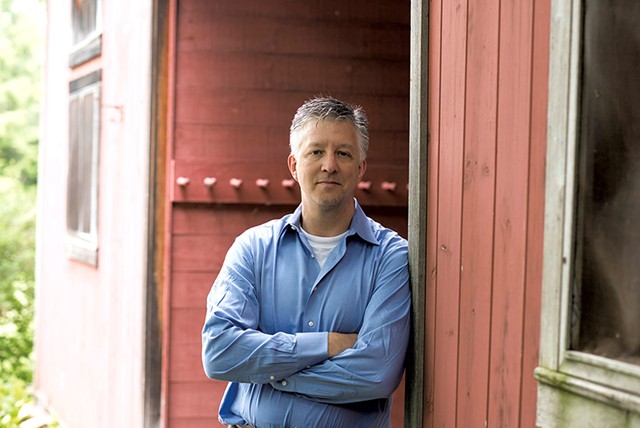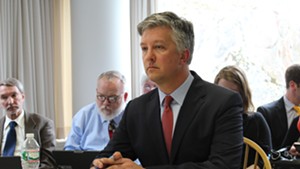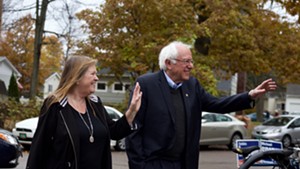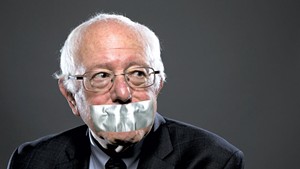
- Caleb Kenna
- Bradly Toensing
No public official is too big or too small to escape the attention of Brady Toensing.
Three years ago, Vermont's most prominent muckraker launched a crusade against Sen. Bernie Sanders (I-Vt.) that landed his wife, Jane O'Meara Sanders, in the middle of an FBI investigation. That same year, Toensing sought to oust a selectboard member in his hometown of Charlotte (population 3,754), accusing the local pol of uncontrolled spending and ethical violations.
A criminal lawyer and vice chairman of the Vermont Republican Party, Toensing regularly finds himself at the heart of what passes for political scandal in the Green Mountain State. His weaponized public records requests have snared a host of liberal politicians, including former governor Peter Shumlin and former attorney general Bill Sorrell. More than once his probes have prompted government investigations.
Toensing (pronounced tun-sing) says he does all this to hold politicians accountable in a state dominated by Democrats. "The inclination of one-party systems to be inept and corrupt is what drives me here in Vermont," said Toensing. "It's supposed to be an adversarial system."
Republicans, for the most part, applaud his efforts. Former gubernatorial candidate Mark Snelling praised Toensing as a whistleblower. Said gas station magnate Skip Vallee, a friend and GOP fundraiser, "He truly believes in sunlight."
Democrats and Progressives have a different take. "I think basically he's a right-wing attack dog," said state Sen. Chris Pearson (P/D-Chittenden), who has been on the receiving end of a Toensing legal complaint.
The Charlotte attorney's motives matter now more than ever: Sources familiar with the matter say he is one of three finalists to become Vermont's next U.S. attorney — the most powerful federal prosecutor in the state.
Republican Gov. Phil Scott and Sen. Patrick Leahy (D-Vt.) endorsed Assistant U.S. Attorney Christina Nolan for the post last month, but the Trump administration makes the final decision. That gives Toensing, who served as President Donald Trump's Vermont campaign chair during the 2016 election, a fighting chance.
During an interview last week at Burlington's Muddy Waters, Toensing wouldn't confirm or deny whether he remains in the running. Equipped with a yellow legal pad and wearing a pale blue button-down shirt, he looked out of place in the bohemian coffee shop. But he didn't seem uncomfortable chatting with the first person he saw — a barista he knew from Charlotte.
Toensing spoke at length about his various investigations, but the 49-year-old father of three was less eager to discuss his personal life, asking sardonically whether he should be "on a couch."
He was exposed to both Republican politics and criminal law at an early age. His mother, Victoria Toensing, served as a federal prosecutor in Detroit. "I grew up with DEA agents at our table preparing for trial," he recalled. When he was 13, Victoria married Joseph diGenova, a lawyer she'd met at the 1980 Republican Convention. Both went on to serve in high-profile roles in the Reagan-era Department of Justice.
Toensing spent his teens in the Upper Valley of Vermont and New Hampshire, where his father ran a medical billing company and where he attended Hanover High School. Even then, he was drawn to Washington, D.C. He spent three summers as a page in the U.S. Senate and then majored in government at Georgetown University, where he rowed on the varsity crew team.
After a brief interlude skiing out West, Toensing scored jobs at the National Republican Senatorial Committee and then as an assistant to senator Warren Rudman, a New Hampshire Republican.
Upon graduating from Georgetown University Law Center in 1996, Toensing helped his mother and stepfather start their own boutique white-collar criminal law firm, diGenova & Toensing. They took on high-profile cases — leading a congressional investigation into the International Brotherhood of Teamsters and representing Newt Gingrich's second wife in an ethics matter — and opined on even bigger cases.
During the Monica Lewinsky scandal in 1998, the couple was omnipresent on television talk shows, criticizing President Bill Clinton and inspiring a Washington Post story with the headline, "The Power Couple at Scandal's Vortex." It described diGenova as a "white-hot media presence, politically connected lawyer and all-around agent provocateur" and noted, "He and [Victoria] Toensing, also a battle-tested former prosecutor, keep popping up wherever there is trouble — as commentators, as investigators, as unnamed sources for reporters."
The younger Toensing intended to leave the new firm after six months. Twenty years later, he said, "I can't think of anyone else I'd want to practice with more."
In 2001, he moved with his wife to the lakeside town of Charlotte to raise their three children, now 16, 17 and 18. Toensing converted an 18th-century barn into his office and began flying back and forth from his Vermont homestead to Washington and wherever else cases took him. His barn office is furnished with rugs he bought on a business trip to Pakistan.
Among his clients: an FBI sniper involved in the 1992 Ruby Ridge shootout and 1993 Waco siege, and the former president of the Bank of Credit and Commerce International — an institution nicknamed the "Bank of Crooks and Criminals" for its willingness to accommodate arms dealers, drug lords and dictators.
While working on Hollywood-caliber cases around the world, Toensing found time to immerse himself in Vermont's small-town political scene.
For nine years, he presided over permit disputes as chair of Charlotte's zoning board. He also went after a selectboard chair in a series of lengthy letters to a local newspaper informed by multiple public records requests. Toensing accused the officeholder of spending $700,000 on legal advice, failing to disclose a conflict of interest and improperly interfering with the zoning regulatory process when a neighbor started a winemaking operation. The allegations overlapped with the chair's reelection campaign, which he lost.
Soon after moving to Vermont, Toensing offered his services — namely, consulting on campaign finance law — free of charge to Republicans Jim Douglas and Brian Dubie, who were running for governor and lieutenant governor, respectively.
"He's incredibly smart, and he's incredibly tenacious and conscientious, so I was the beneficiary of that," said Dubie, who won the 2002 race.
When Dubie ran for governor eight years later, Toensing revealed through a public records request that a Vermont State Police trooper had voided a speeding ticket for Shumlin, Dubie's Democratic opponent. Despite his close ties to Dubie, Toensing claimed to have been acting independently.
The enterprising attorney made headlines again in June 2013, when he volunteered to represent Shumlin's indigent neighbor, Jeremy Dodge, who had sold his house to the governor but subsequently concluded he'd gotten a raw deal. Assuming Toensing would exploit the case for political purposes, Democrats braced for a lengthy legal dispute.
Instead, the controversy was resolved quickly and quietly, with Shumlin agreeing to sell the house back to Dodge.
Former Democratic attorney general Jerome Diamond, who represented the governor during those negotiations, recalled that Toensing was "professional and straightforward" and made no attempts to "play tricks and games or be deceptive."
To this day Toensing insists that there was nothing political about his participation.
Some dismiss that claim as laughable. "I think he's a political animal more than an ethical lawyer seeking justice," said Sorrell, the former attorney general.
During Sorrell's 2012 reelection campaign, Toensing drafted a complaint for Vermont Republican Party chair Jack Lindley alleging that the incumbent had illegally coordinated with a super PAC that poured $200,000 into the race.
That was only the beginning. In 2015, Toensing filed a series of complaints, based on reporting by Seven Days, that accused the AG of "flouting" campaign finance laws and steering government business to donors.
Toensing requested — and ultimately secured — a highly unusual independent investigation. At the time, Toensing told Seven Days, "General Sorrell acts with the shameless confidence and hypocrisy of an epaulet-wearing, third-world despot."
Reached by phone last week, Sorrell said Toensing waged a smear campaign against him with "essentially no evidence." He continued, "Toensing has brought D.C.-style character assassination politics to Vermont."
The investigation didn't result in any charges against Sorrell, but it was limited in scope and didn't address the allegations of bribery. While the probe was still ongoing, Sorrell announced that, after nearly two decades in office, he wouldn't seek reelection.
Aside from his public records requests, Toensing's most powerful tool may be his media savvy. Jocular and well-connected, he's adept at garnering news coverage that works to his advantage. Following in the footsteps of his parents and law partners, he has appeared on Fox News and is regularly quoted by Breitbart News Network and other conservative organs.
Last fall, Toensing leveraged his connections to help Fredo Arias-King, who owns a chemical company that distills pine resin in Mexico. The businessman claimed that a Tennessee chemical company sourced its resin from drug cartel-controlled producers.
Toensing and his partners helped Arias-King get a story published in the Daily Beast exposing Eastman Chemical's alleged practices, which he believes prompted the company to finally enter into talks with him. "The Toensings readily understood that they had to be creative when there are no institutions," Arias-King said.
Journalists recognize Toensing's skills. Pulitzer Prize-winning investigative reporter James Bandler got to know him while covering white-collar crime at Fortune Magazine. "He's an unabashed GOP partisan, but he also understands how investigative journalists work," said Bandler, who lives in Norwich. "He's got a nose for a good story and can ferret out hypocrisy and scandal."
In Vermont, news organizations stand to benefit from Toensing's relentless push for public-records access.
Last year, before Sorrell stepped down, the Charlotte lawyer sued the attorney general's office for refusing to comply with one of Toensing's trademark public records requests. He argued that state officials must search their personal email accounts for potentially public records. After a lower court ruled against him, he took his case to the Vermont Supreme Court, which heard arguments in May but has not yet ruled. (Seven Days and other news outlets filed a brief in the case supporting his interpretation of the law.)
This particular legal endeavor has even endeared him to some Democrats.
"He is a formidable adversary, no doubt about it," said Attorney General T.J. Donovan. "I happen to disagree with him on pretty much everything, but I recognize that he's talented and he's smart and he's tough."
Donovan went so far as to suggest that he admired the legal battle that Toensing is waging against his own office over access to public officials' personal email accounts.
"At the end of the day, this is a good exercise to go through for us and the state, because it's going to make state agencies and officials more accountable to the public," the AG said. "Is it frustrating? Hell yes, but at the end of the day I think that's a good thing."
(Toensing donated to Donovan's 2016 campaign.)
Secretary of State Jim Condos is firmly in Toensing's camp on the case, sharing the view that personal accounts can't be unequivocally shielded from the public records act.
"I do think what he is doing right now is a service to Vermont," the longtime Democrat said, adding, "I'm probably gonna get killed by my party for saying this."
The Sanders investigation is by far Toensing's biggest "case," but it's also caused some to question his motives. He said he became interested in Burlington College in 2014 after reading a news story about its financial decline, which began shortly after the senator's wife, Jane O'Meara Sanders, stepped down as president. During her tenure, O'Meara Sanders borrowed $10 million to purchase a lakefront campus — a decision that contributed to the college's 2016 demise.
Toensing obtained and shared with journalists financial documents that he believes show that O'Meara Sanders overstated pledged donations in order to secure the loan. He then used the stories those reporters wrote to lodge a federal complaint accusing her of loan fraud. O'Meara Sanders has denied the allegation, but the FBI has been investigating it since shortly after Toensing filed his January 2016 complaint.
A later, more damning allegation made by Toensing — that the senator's office pressured a bank to approve the Burlington College loan — has found less purchase. His own source in the matter, Rep. Don Turner (R-Milton), dismissed it last month as "hearsay."
Toensing stands by his decision to file a complaint based on Turner's tip and maintains that his approach is "fact-driven." Critics contend that it shows his willingness to tarnish reputations with tenuous claims.
"This revelation proves what most already knew," Sanders family spokesman Jeff Weaver said in response to the Turner flap. "Brady Toensing, who was Trump's Vermont campaign manager, is a right-wing hack trying to impugn Bernie Sanders with no foundation whatsoever."
Neither Sanders' office nor Weaver responded to requests for comment for this story.
"My complaints are based on public records, an analysis of facts from those records and good reporting from some of the few investigative reporters that are left in this state," Toensing said. "It's amazing how the bureaucracy sort of inclines toward secrecy."
He maintains that his ultimate goal is government transparency, not GOP supremacy.
"It's important to hold elected officials accountable," said Toensing. "Some people do crosswords. I write public records requests."
Still, it's hard not to notice a pattern across his requests. Pearson, the state senator, observed that, "He only happens to make requests of Progressives and Democrats — total coincidence, I'm sure."
Pearson argues that damage is being done — and not just to the targets of Toensing's investigations. "I think he contributes to a culture that makes participating in Vermont politics less and less appealing for people."
The state senator didn't dismiss Toensing's efforts — "It is tough, because there is a role for public watchdogs" — but suggested his motives aren't quite pure.
"When it's just a fishing expedition and it's the 20th [records request] of the year for him on different Democrats and Progressives, I think it's more than just an insanely curious lawyer from Charlotte," Pearson said.














Comments (3)
Showing 1-3 of 3
Comments are closed.
From 2014-2020, Seven Days allowed readers to comment on all stories posted on our website. While we've appreciated the suggestions and insights, right now Seven Days is prioritizing our core mission — producing high-quality, responsible local journalism — over moderating online debates between readers.
To criticize, correct or praise our reporting, please send us a letter to the editor or send us a tip. We’ll check it out and report the results.
Online comments may return when we have better tech tools for managing them. Thanks for reading.